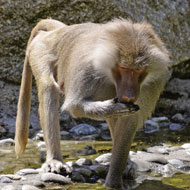Baboons can make vowel-like sounds, study finds

Researchers say their findings suggest language may have begun to evolve around 25 million years ago.
Baboons are capable of making at least five vowel-like sounds similar to humans, according to new research which suggests spoken language may have evolved far earlier than previously thought.
Mapping the course of language evolution is one of science’s greatest challenges. It has long been thought that a lower larynx is needed for human speech, and the higher position of the larynx in non-human primates prevents them from producing the vowel sounds that are found universally in our language.
But according to new research published in the PLOS ONE journal, baboons can make five vowel-like sounds and combine them when communicating with others. Researchers analysed the vocalisations, tongue anatomy and acoustic potential of 15 guinea baboons.
They believe their findings suggest language may have begun to evolve around 25 million years ago, rather than 70,000-100,000 years ago as previously thought.
Louis-Jean Boë from Grenoble Alpes University in France, and colleagues, wrote: ‘It suggests that spoken languages evolved from ancient articulatory skills already present in our last common ancestor with Cercopithecoidea.’



 The veterinary mental health charity Vetlife is inviting the veterinary community to join it for a sponsored cold-water dip.
The veterinary mental health charity Vetlife is inviting the veterinary community to join it for a sponsored cold-water dip.